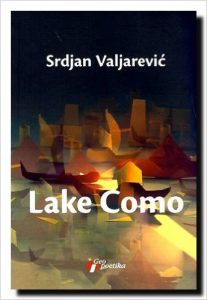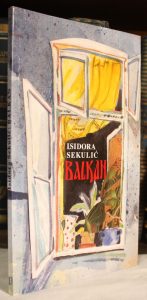Residency programs are an important part of the working life of many authors today. They provide for a limited time, maybe a few weeks, a month, or a little bit longer a place in an interesting surrounding, suited to the specific requirements of authors, and frequently they come with a certain sum of money plus free board and plenty of opportunities to socialize with other people working on projects in the making in their respective field – other authors, artists, scientists. In the best case, residency programs provide an opportunity for an author to focus on his/her work, to write or finish a manuscript with which he/she has struggled since a long time and also to collect and exchange new ideas for new projects. Participating in such a program means that as an author you have for this limited time not to think about anything else than your work, particularly not about money. Everything is well taken care of by the host.
Contrary to what you could expect, the central role of residency programs for many modern authors is not reflected in the literary output of most of these authors. Very rarely – at least this is my impression – are works of fiction dedicated to experiences that authors make with such programs. There are exceptions of course, such as Lake Como by the Serbian novelist Srdjan Valjarevic, the book about which I am writing here.
Nothing spectacular happens in this book: the narrator, a Serbian author that has for sure many similarities with the author of Lake Como, wins a Rockefeller scholarship that comes with an invitation to spend one month in the lovely Villa Maranese in Bellagio near Lake Como. A good opportunity to finish a novel (which he has indeed no intention to write at all), and also to leave behind a flat in Belgrade with a leaking roof, some financial debts and other personal problems, and a more and more difficult situation for intellectuals that are not in line with the official ultra-nationalist Serbian politics and its consequences. It is the end of the 1990s and the armed Kosovo conflict is in its early stages.
During his stay in the Villa, the author meets all kind of other Rockefeller fellows from all over the world busy with all kind of projects. People talk, socialize, eat and drink, gossip, work a bit or rather not, a composer gives some house concerts. The author feels like an outsider because of his age (he is by far the youngest in the Villa), his origin, his interests and even his clothes (he only reluctantly gets used to wearing a tie, which is strongly recommended in the Villa), not to talk about his drinking and smoking habits. (My apologies when I mention the drinking so frequently, but there isn’t probably a single page in the book when the narrator doesn’t have a drink.)
An additional predicament is that the protagonist has to lie to almost everyone about his work: since he is known to be a novelist, people want to know how the work with the novel is going and instead of telling them that he is just enjoying the time doing nothing – except eating, drinking, sleeping, and the occasional walk to the village or a nearby hill – the author/narrator is making up things related to the non-existing novel. But the not existing work in progress is at least a good excuse to get away from activities in which he doesn’t want to participate.
Apart from that, he explores the village, has a short fling with a female guest of the Villa, makes friends with a friendly bar owner, as well as with Alda, a young charming girl working in another bar with whom he is communicating in a mixture of English, Italian, and drawings. He makes some friends at the Villa as well, particularly the waiters that provide a never-ending stream of wine, whiskey and other alcohol, but that are also a valuable source of information about the place. With Mr Sommerman, a holocaust survivor and retired literature professor and his wife, he is developing a friendship that will probably last even after he leaves the Villa when the time is over. And the meeting with another guest who visited once the island of Korcula in what is now Croatia brings back long hidden memories to the author because this place had a particular importance in his earlier life.
Of course, this book reminded me more than a bit of The Magic Mountain by Thomas Mann. The villa is on a hill – ironically called “Tragedy” – not a real mountain, but the setting is very idyllic (Bellagio is already part of the Mediterranean world, but with a view to the snow-covered mountains of the Alps), like a temporary paradise isolated from the rest of the world with all its problems. Valjarevic has a very good ability to characterize people and it seems he talks of his own experience, so vividly retold are many episodes, frequently with a slightly detached irony. There are also beautiful pages where he is describing the nature at Lake Como. And also small observations like what he is writing about the transistor radio, were really interesting to read for me. The visit of Alda and her family on the hill – for some strange reason, most people from the village have never visited the Villa; so near and yet so far are these worlds from each other usually – is a highlight of the book.
A little bit on the downside though is the fact that a considerable part of the novel is a repetitive mentioning of drinking, eating and sleeping habits of the narrator. Not a single drink goes unnoticed, and after a while I was really not so much interested any more in what the narrator did to his liver. This feeling of repetitiveness is even strengthened by the author’s habit to write many short sentences starting with “I”. I did this. I did that. I did this. Then I did that. Ok, most sentences are a bit longer, but the style was for me in many parts of the book not very attractive. Although the narrator refers to Robert Walser, Robert Musil, Walter Benjamin as favourite authors, the style of the novel is more like Hemingway – and that is not at all a compliment in my opinion. These issues somehow prevented me from enjoying this book as much as I wanted to like it.
Srdjan Valjarevic is an interesting and very talented author. With some more editing, Lake Como could have been an excellent novel.
Geopoetika, a publishing house in Belgrade, has published a series of books by contemporary Serbian authors in English. I can recommend you this series if you want to get to know interesting literature from Serbia.

Srdjan Valjarevic: Lake Como, translated by Alice Copple-Tosic, Geopoetika, Belgrade 2009
© Thomas Hübner and mytwostotinki.com, 2014-6. Unauthorized use and/or duplication of this material without expressed and written permission from this blog’s author and/or owner is strictly prohibited. Excerpts and links may be used, provided that full and clear credit is given to Thomas Hübner and mytwostotinki.com with appropriate and specific direction to the original content.








 Facebook
Facebook RSS
RSS Twitter
Twitter